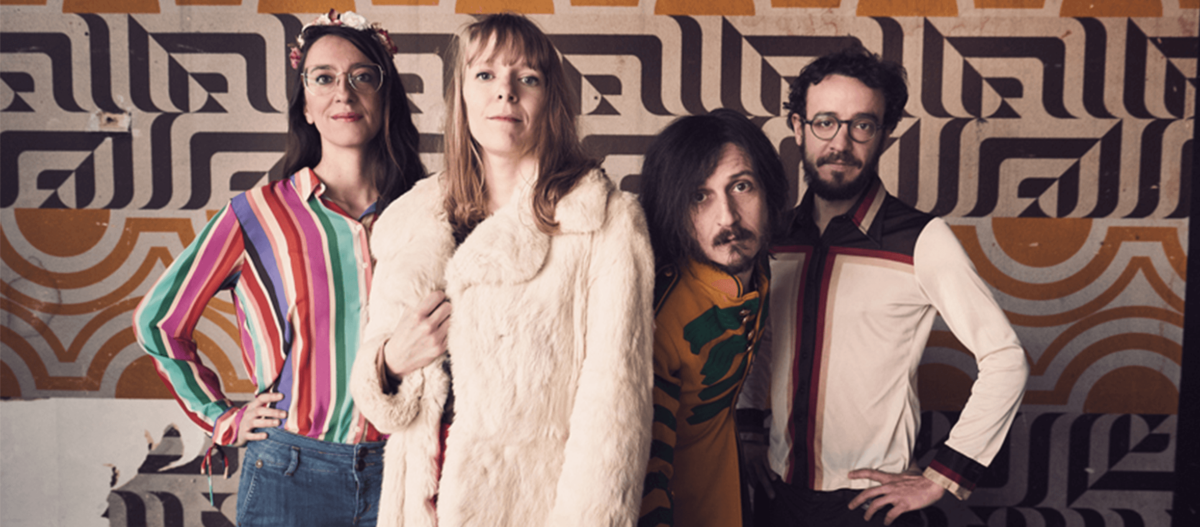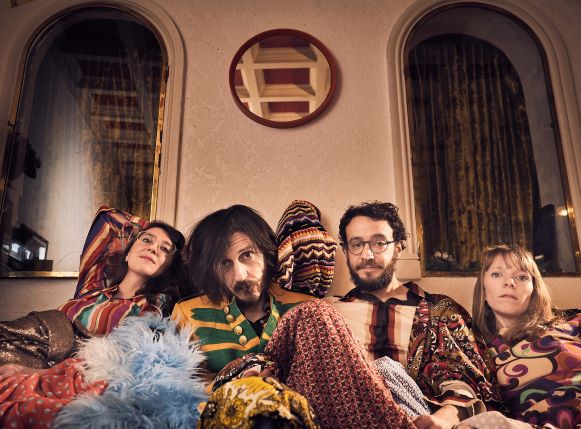Interview | Odessey & Oracle, bright pop and pamphlets in the background

Beware : One Crocodile may hide another
On the occasion of their concert at the Périscope on June 24th, the baroque pop group answered questions about their influences and their artistic universe.
Why did you choose the name of a Zombies album? What links you so strongly to this band ?
There was something very strong about this record. When you discover the cover, and this title, even before you hear the music you know that things are going to happen. And then come the songs, the explosion of colour in the arrangements, the writing that is both obvious and ultra-sophisticated but never bombastic. The voice of Blunstone (singer of The Zombies), the sound of the record which is magnificent! We kind of met with this album and even though the plan was not to imitate this music, for a band like us who wanted to explore the contours of the song format, this mysterious yet evocative record title stood out.
“We want to move the cursor and reclaim popular music […] as an open field for experimentation”
Your musical project seems to represent another conception of pop music. How do you work with this relationship between pop and scholarly music? What about this “experimental variety” to which you refer?
We were talking about the Zombies album and it’s true that the end of the 60s laid the foundations of a certain popular music that communicated with the research of the experimental avant-garde, and integrated elements of classical (or baroque) writing, it’s particularly visible in bands like White Noise or The United States of America, and in an even more mainstream register on certain Beatles albums, the Beach Boys…
This approach has lasted and gradually faded away so that today, the music business almost no longer relies on this type of approach, there is indie-underground music in which some bands are in an “experimental” research but most of the time without vocation to become hegemonic, and on the other hand “commercial” music where the purpose is to go directly to familiar ground to maximize adhesion (and profit).
<I don’t know if you’re going to say anything about it, but I’m not.
Of course, we’re schematising, not everything is black and white, but it’s a trend and we want to move the cursor and reappropriate popular, mainstream music (hence the term “variety”) as a field open to experimentation, to research in sounds or composition.
Listening to your latest album, one can feel a gap between the harshness of the images you evoke and your solar and psychedelic instrumentations. Is this contrast intended? If so, for what reasons?
This is obviously intentional, one cannot afford to describe a cruel, violent reality without at the same time attempting to deliver a message of hope. You can see this approach in quite a few songs from the late 60s (again! ) where the lyrics were against the atrocities committed by the US in Vietnam but at the same time conveyed an optimistic energy: “Yeah, we live in a crazy society but we’re becoming aware of it and soon the people will rise up against injustice and another society will come about”.
From an aesthetic point of view too, we find it interesting to talk about barbarism without being musically redundant, and especially to avoid being didactic…
What was the compositional dynamic for your latest album Crocorama? Is there a concept behind this album?
This time not so much. The first album was typically a concept album with this alternation of songs and instrumentals in the form of little instrumental fugues each time differently. The second album had a common thread: money as the all-powerful god of our societies. With Crocorama , we wanted to make a catalogue of songs that weren’t necessarily related to each other. We listened to a lot of music sung in French (something we hadn’t really explored before) and the plan was to make a record of songs, of “variété” but in our own way…
We’ll let people be the judges of the result but that was the only concept at the beginning.
You seem to be very influenced by the music of the 60’s, are there any contemporary art scenes that inspire you or mark you as strongly?
We are indeed very influenced by old music (even very old like baroque or medieval music), the MPB (Brazilian Popular Music) of the 70’s also influences us a lot… After that, we really listen to everything (jazz, trad music, pop, etc…) and including (fortunately) contemporary music. The influence of today’s bands (themselves influenced by older things, it should be remembered) is necessarily present in our music, at least in an unconscious way…
We’re necessarily influenced by everything we listen to, but as a general rule, we’re more interested in trying to sound different by combining musical elements we like (e.g. chanson register and baroque counterpoint, convoluted melodies in a pop format) rather than letting the influence of this or that artist be felt.
After all, we’re not so much influenced by 60s music as we are by 70s music, it’s probably the name of the band that evokes this privileged connection with people…
